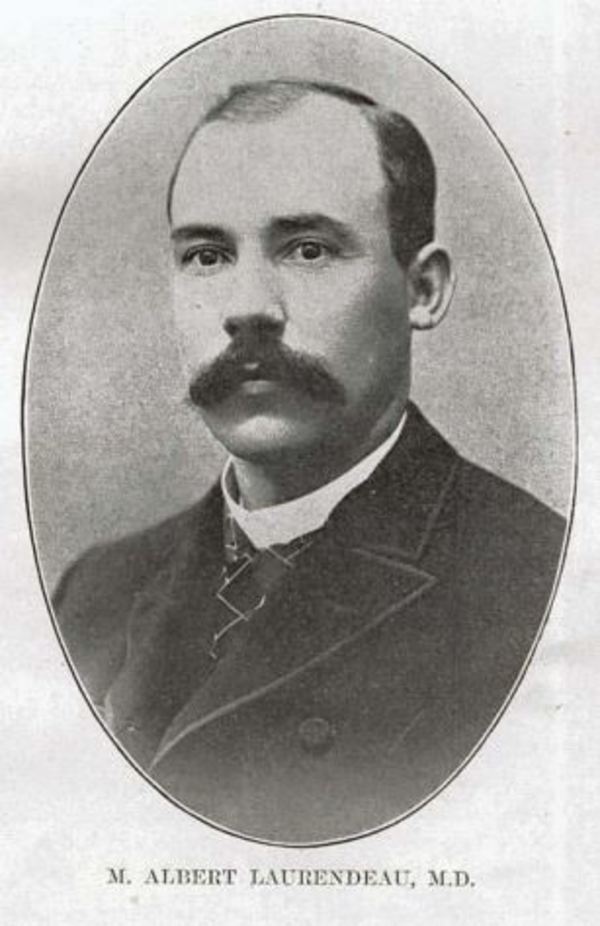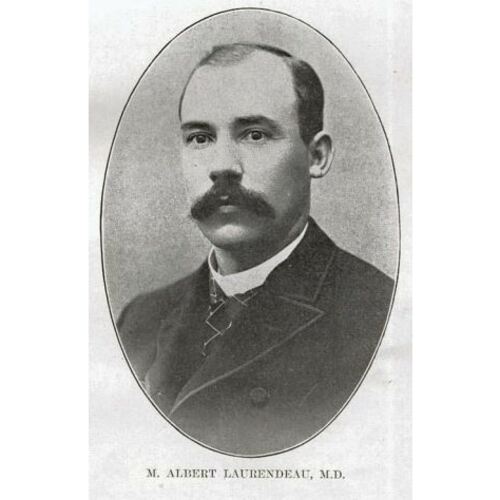
Source: Link
LAURENDEAU, ALBERT (baptized Joseph-Olivier-Albert), physician, politician, and author; b. 1 March 1857 in Saint-Gabriel-de-Brandon, Lower Canada, eldest son of Dr Joseph-Olivier Laurendeau and Céline Dostaler; m. 23 Sept. 1879 Marie-Georgianna Mérizzi in Napierville, Que.; d. 19 Aug. 1920 in Saint-Gabriel-de-Brandon.
Albert Laurendeau, son of a prominent medical practitioner in Saint-Gabriel-de-Brandon, northeast of Joliette, received his early education in the village school. He entered the École Normale Jacques-Cartier, Montreal, in 1872; following graduation, he enrolled in the Montreal School of Medicine and Surgery, then an affiliate of Victoria College in Cobourg, Ont. After his graduation and marriage in 1879, he joined his father’s practice. Four children were born to the marriage, three daughters and one son, Aldéric, who would continue the family tradition as a medical doctor.
A devoted citizen of his community, Laurendeau served as mayor from 1889 to 1892. Naturally his life focused on caring for the sick and promoting public hygiene. He was known for his willingness to treat his patients in their homes, to instruct local schoolchildren about health, and to advocate temperance. He devised at least one medical instrument, experimented with a variety of cures for common diseases, and often described these innovations either at professional meetings or in the pages of the Montreal periodicals La Clinique and L’Union médicale du Canada. He would be particularly proud of his success in combating the 1918–19 influenza epidemic, losing only 12 of the nearly 500 patients he treated in the region.
Laurendeau’s medical practice did not exhaust all of his time and energy or his intellectual curiosity. Moreover, it did not provide him with sufficient income to support his growing family. At various times in his life, like other Quebec doctors, he engaged in business activities, in his case discount banking and the promotion of wood fibre and potash production. This Darwinian “struggle for life,” as he called it, resulted from cutthroat competition and inadequate fees. One solution, adopted by the Société Médicale du District de Joliette in 1913, was a uniform fee schedule: home visit 1 to 2 dollars, setting a simple fracture 5 to 10 dollars, an appendectomy 40 to 60 dollars. Increased incomes would ensure a respected status. “The physician must occupy an elevated position in the social hierarchy, and he cannot maintain his rank [and] compel the confidence [and] the respect of the public without adequate revenue,” he maintained.
Improved incomes were only part of Laurendeau’s proposals for the reform of the Quebec medical profession. The province, he believed, suffered from a surplus of doctors and the activities of a variety of unlicensed bone-setters, healers, and other “charlatans.” Stricter licensing regulations, careful enforcement of medical ethics against doctors who, for example, sold alcohol for non-medicinal use, and rigorous educational standards were his principal suggestions for change. His goal, as he explained in 1910, was to “increase the quality and decrease the quantity of Hippocrates’s disciples in our province.” Professionalization required organization. Following the first meeting of the Association des Médecins de Langue Française de l’Amérique du Nord in Quebec City in 1902, Laurendeau had led in founding the Société Médicale du District de Joliette in 1903, serving as secretary-treasurer. Almost continuously from 1904 to 1920, he was an elected governor of the College of Physicians and Surgeons of the Province of Quebec, of which he became vice-president in 1918. As chairman of the college’s committee on legislation, he had lobbied effectively to ensure the passage of a new medical act in 1909, which increased the autonomy and jurisdiction of the college and standardized admission requirements and curricula in Quebec’s medical faculties. Although he favoured close cooperation among provincial medical associations in Canada and the establishment of a federal ministry of health, he nevertheless insisted that the Société Medical de Quebec should remain autonomous so that French-speaking doctors could “preserve intact our language, our customs and habits, our national organization, in a word, our rights.”
Even after the curricular reforms of 1909, Quebec medical schools continued to place a heavier emphasis on humanistic than on scientific studies. Laurendeau believed that this imbalance needed radical redress. For him the principal weakness of the French-language educational system generally was an excess of classical colleges and a shortage of technical, agricultural, industrial, and commercial colleges. More serious, however, was the system’s failure to teach “our young people the general principles of the practical and natural sciences – by relying solely on natural processes and facts, guided only by reason.” For Laurendeau, science was the key to the future of humanity and, for Quebec, an essential for survival in the modern world.
Laurendeau’s scientific outlook was based on a wide and diverse reading in the field of late-19th-century natural science and particularly the subject of biological evolution. In 1907, in an address to his medical colleagues in Joliette, he opened up a subject that would embroil him in controversy for much of the rest of his life. On that occasion he set out what he understood to be the essential teachings of modern evolutionary doctrine. The bishop of Joliette, Joseph-Alfred Archambeault, reacted immediately, demanding a full explanation of the doctor’s views and his submission “to the supreme and infallible authority of the Church.” Laurendeau responded by insisting that nothing he had said denied religious truth or ecclesiastical authority. Science and religion, he believed, should be kept separate, a position which the bishop recognized as the heresy of modernism. For the moment the cleric and the doctor reached a modus vivendi under which Laurendeau submitted to his bishop. The truce did not last, for Laurendeau had not changed his mind and over the next few years his scientific convictions hardened. In 1911 he published, presumably at his own expense since it acknowledged no publisher, a book entitled La vie: considérations biologigues. There he advanced the case for evolutionary doctrine, presented by Lamarck and Darwin, as a demonstrated explanation of human development. This scientific naturalism, he argued, was accepted by many Catholic thinkers in Great Britain and France and should be judged by scientific, not religious criteria. He held that Quebec’s backwardness in scientific matters resulted from an educational system that failed to keep pace with modern knowledge. “Here, in our province,” he declared, “we are in the same position vis-à-vis Lamarck and Darwin that the Christian world was in during the 14th and 15th centuries vis-à-vis Copernicus and Galileo.”
La vie, for all its erudition, was a polemic, one which revealed an unsophisticated understanding of Darwinian science and its essential difference from Lamarck’s progressive “transformism.” Although he had received permission to include in his book his earlier exchanges with his bishop, Laurendeau must surely have realized that Archambeault’s reaction to his attempt to separate religion and science would be negative. If he expected the bishop to reopen their discussion, he seriously underestimated his opponent. For Archambeault, the discussion had been concluded; the time for action had arrived.
In March 1912 the bishop issued a circular condemning La vie and forbidding the laity to read it. In the newspaper L’Étoile du Nord he unambiguously denounced the book for its theological and philosophical errors, its misconception of human liberty and intelligence, its failure to accept “the authority of the church in scientific matters,” and its “exaggerated praise of atheistic and materialistic scholars and philosophers.” He demanded that Laurendeau recant. For nearly a year the doctor held his ground despite the threat that the sacraments, including a Catholic burial, would be denied to him. In the end, doubtless under intense pressure from his community and his family – one brother was a Jesuit – Laurendeau admitted his errors and resolved to write nothing further. Although he hoped that his decision would not be publicized, the bishop announced his victory in L’Étoile du Nord.
For the next six years Laurendeau conformed to the requirements of his bishop but he did not alter his beliefs. In 1918, five years after the death of Archambeault, he publicly repeated his unaltered faith in scientific naturalism, admitting that he remained “a trouble-maker.” Suggesting that he had never been given a fair opportunity to elucidate his views, he explained to the readers of La Clinique his evolutionary convictions and his certainty that without freedom of thought genuine science would never flourish in Quebec. He concluded that “we are still in the Middle Ages.” The discussion that followed quickly subsided, the ecclesiastical authorities apparently preferring silence to renewed controversy.
The last years of Albert Laurendeau’s life were peaceful, but he was, as always, extremely busy both as a leader in his professional associations and in attending to his patients during the influenza crisis. Perhaps overwork contributed to the heart attack which killed him as he drove his automobile home after visiting a patient. His funeral mass was sung by his brother Fortunat in the parish church of Saint-Gabriel-de-Brandon. His colleague Dr Joseph Gaudreau summed up his active, often tumultuous life when he wrote that “his originality lay especially in his often not being of the same opinion as everyone else.”
[Father François Lanoue generously provided me with the correspondence between Bishop Joseph-Alfred Archambeault and Albert Laurendeau, which is preserved in the Arch. de l’Évêché de Joliette, Que. I would also like to thank Xavier Gélinas, who carried out indispensable research for me.
Laurendeau’s writings include L’avenir de la médecine ([Québec?], 1908) and La vie: considérations biologiques (Saint-Gabriel-de-Brandon, Qué., 1911), as well as numerous articles published in La Clinique (Montréal), nouv. sér., 1 (1910–11)–10 (1919–20), and L’Union médicale du Canada (Montréal), 39 (1910)–48 (1919). Obituary notices appear in Le Devoir, 20 août 1920, La Presse, 20 août 1920, L’Étoile du Nord (Joliette), 20 août 1920, La Clinique, nouv. sér., 11 (1920–21): 93–94, and L’Union médicale du Canada, 49 (1920): 461–63. r.c.]
ANQ-M, CE4-6, 23 sept. 1879; CE5-23, 3 mars 1857. Carl Berger, Science, God, and nature in Victorian Canada (Toronto, 1983). Luc Chartrand et al., Histoire des sciences au Québec (Montréal, 1987). Denis Goulet et André Paradis, Trois siècles d’histoire médicale au Québec; chronologie des institutions et des pratiques (1639–1939) (Montréal, 1992). François Jacob, La logique du vivant: une histoire de l’hérédité ([Paris], 1970). Emst Mayr, One long argument: Charles Darwin and the genesis of modern evolutionary thought (Cambridge, Mass., 1991).
Cite This Article
Ramsay Cook, “LAURENDEAU, ALBERT (baptized Joseph-Olivier-Albert),” in Dictionary of Canadian Biography, vol. 14, University of Toronto/Université Laval, 2003–, accessed April 25, 2025, https://www.biographi.ca/en/bio/laurendeau_albert_14E.html.
The citation above shows the format for footnotes and endnotes according to the Chicago manual of style (16th edition). Information to be used in other citation formats:
| Permalink: | https://www.biographi.ca/en/bio/laurendeau_albert_14E.html |
| Author of Article: | Ramsay Cook |
| Title of Article: | LAURENDEAU, ALBERT (baptized Joseph-Olivier-Albert) |
| Publication Name: | Dictionary of Canadian Biography, vol. 14 |
| Publisher: | University of Toronto/Université Laval |
| Year of revision: | 1998 |
| Access Date: | April 25, 2025 |



